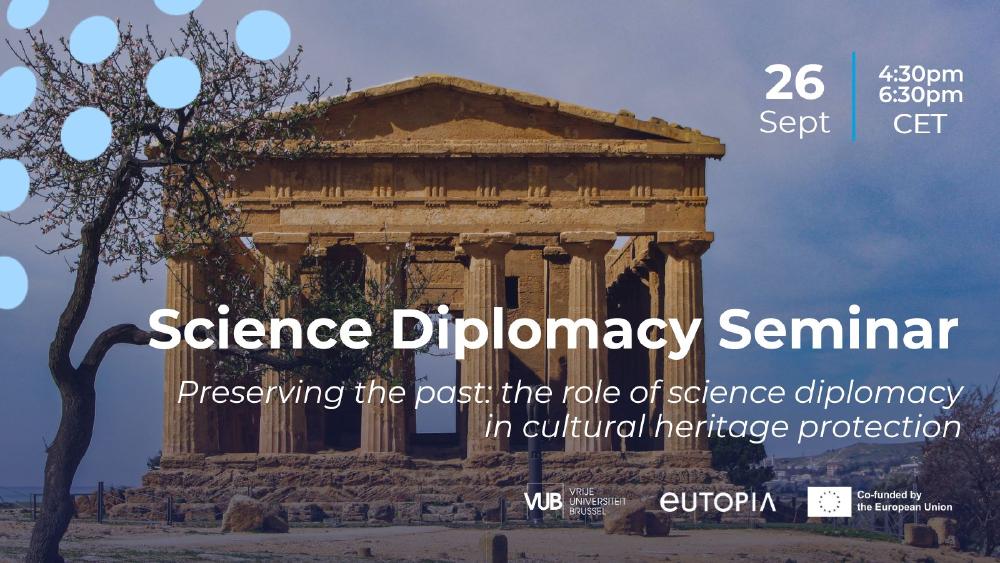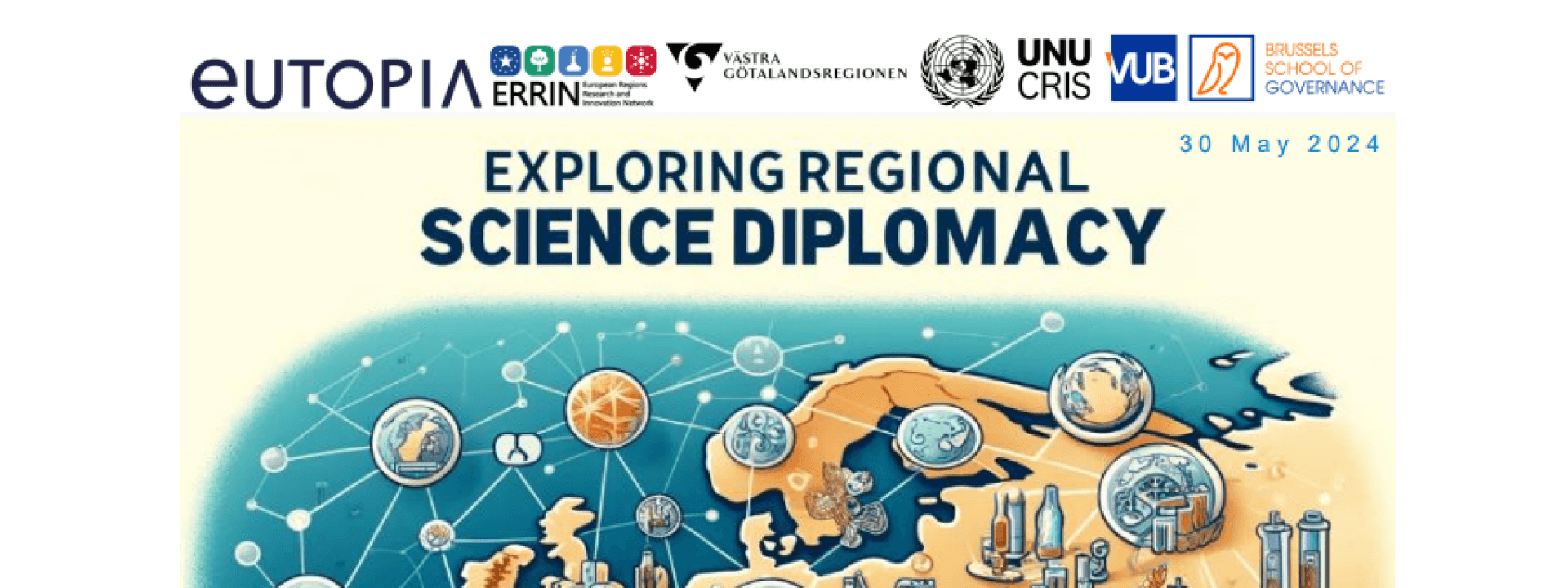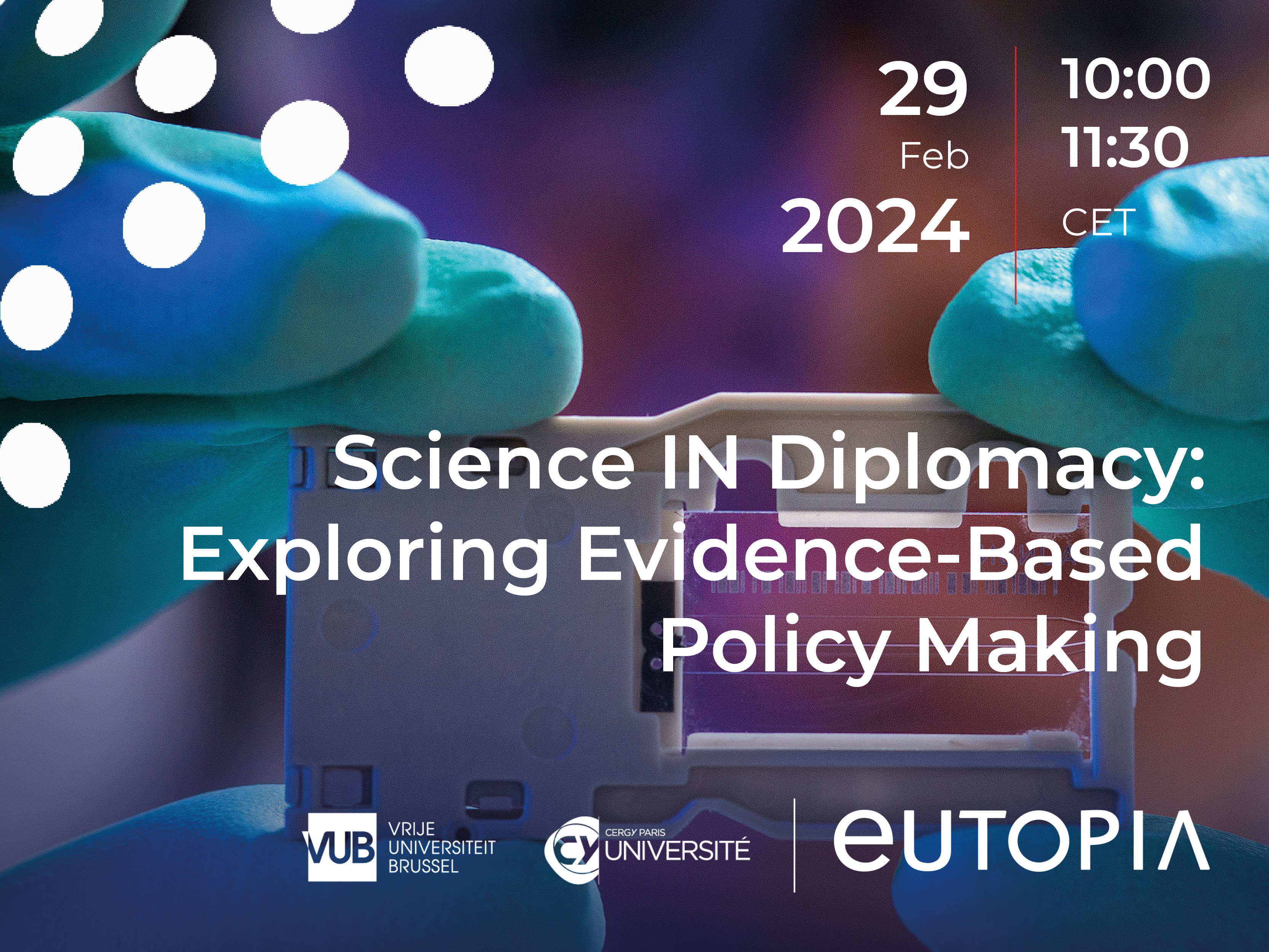You are here :
- EUTOPIA website
- Home
- ENGAGEMENT
- Science Diplomacy
- Science Diplomacy Seminars
Science Diplomacy Seminars
EUTOPIA recognizes the important role that universities play in science diplomacy, which is why it has a work package dedicated to fostering collaboration and knowledge exchange in this field. The EUTOPIAn Science Diplomacy Seminars are a cornerstone of this effort, serving as platforms for bringing together experts, researchers, policymakers, and students from various disciplines and backgrounds to better understand the dynamics of this rapidly evolving and increasingly important field. During the EUTOPIA MORE project, we aim to create awareness and capability in the field of Science Diplomacy. We have a target of eight seminars to be organised before December 2024. Following a generalist approach for the first two sessions and tackling specialized themes for the other six, our seminars are aimed at the EUTOPIA community: students, PhD scholars, and academic and administrative teams.
Follow the Science Diplomacy Seminars here.
- Preserving the Past: The Role of Science Diplomacy in Cultural Heritage Protection - 26 September 2024
-
When, Where, Who
VUB Main Campus Etterbeek, Pleinlaan 2, 1050 Elsene Building D, room D.0.05
Contact: eric.piaget@vub.be
Overview
Cultural heritage, encompassing both tangible artifacts and intangible traditions, is a cornerstone of human identity and historical continuity. However, it faces unprecedented threats from many angles: natural disasters, climate change, armed conflicts, urban development, and illicit trafficking to name a few. From the degradation of the Great Barrier Reef, to the disastrous effects of war on the ancient city of Palmyra, our collective cultural heritage faces a precarious future. Science diplomacy, which combines scientific knowledge with diplomatic efforts, offers a powerful approach to mitigate these threats and ensure the protection and preservation of cultural heritage worldwide. It holds promise to play a pivotal role in many ways, such as by fostering research collaborations, building capacity, shaping policy, and providing crisis response.
This EUTOPIA science diplomacy event will delve into the multifaceted role of science diplomacy in cultural heritage protection in the form of a panel discussion. It will highlight successful case studies where international scientific cooperation has made significant strides in preserving heritage sites and artifacts. The discussion will also address the challenges and opportunities that arise when science intersects with diplomatic endeavours in the realm of cultural heritage.
Guiding Questions for the Panel- How can international scientific collaborations enhance the protection and preservation of cultural heritage?
- What strategies can be employed to overcome the geopolitical challenges in heritage conservation efforts?
- In what ways can science diplomacy contribute to creating robust international policies for cultural heritage protection?
- How can we balance the need for local engagement with global scientific and diplomatic efforts in heritage preservation?
- What role does science diplomacy play in raising public awareness and fostering community involvement in cultural heritage protection?
- What are the diplomatic dimensions of museum collections, and how can they influence international relations?
This discussion is expected to increase the awareness of the role of science diplomacy in cultural heritage preservation, highlight the need for enhanced collaboration between stakeholders, and showcase different strategies that can be emulated to ensure our past is also our future.
Panel
Moderated by Dr. Christina Hainzl, Head of Research Lab Democracy and Society in Transition at University for Continuing Education Krems, Austria.
H.E. Amna Baloch, Ambassador of Pakistan to the European Union, Belgium and Luxembourg
Mr. Oriol Freixa Matalonga, Liaison Officer for Culture, UNESCO
The panel will also consist of representatives from Europa Nostra and the academic community. We invite you to revisit this page as names and positions are finalised.
About EUTOPIA’s Science Diplomacy Seminars
EUTOPIA recognises the important role that universities play in science diplomacy, which is why it has a work package dedicated to fostering collaboration and knowledge exchange in this field. The EUTOPIA Science Diplomacy Seminars are a cornerstone of this effort, serving as learning platforms to better understand the dynamics of this rapidly evolving and increasingly important field.
REGISTER NOW!
See the dedicated page at the Vrije Universiteit Brussel’s website
- Exploring Regional Science Diplomacy - 30 May 2024
-
OVERVIEWScience diplomacy has traditionally been positioned in the framework of national and supranational endeavours. Consequently, the discourse and investigation into science diplomacy at the subnational-regional level remain scant. This oversight is notable considering these actors also play a key role on the international stage, including through leveraging their scientific research and innovation capabilities to bolster their global profiles and contribute to solving global problems.
This science diplomacy seminar will be held in concert with the European Regions Research and Innovation Network (ERRIN), the Unit on Non-Traditional Diplomacy (UNU-CRIS and BSoG), and EUTOPIA associate partner Region Västra Götaland. The event aims to facilitate a rich dialogue among regional representatives and academics to share and explore effective strategies for achieving their science diplomacy objectives. A focal point of discussion will be the intricate interplay between universities and their regional contexts, delving into how this partnership epitomises the 'triple helix' model of innovation, characterised by the collaborative interdependence of academia, industry, and government.
During this event, we will:
- Explore how regions can utilise their scientific institutions, research centres, and innovation ecosystems to influence global scientific collaboration and diplomacy.
- Examine the contributions of regions to global issues such as climate change, public health, and sustainable development through science diplomacy.
- Investigate the ways in which science diplomacy can spur innovation, attract investment, and promote economic development at regional levels.
- Delve into the models for successful collaboration between academic institutions and regional governments to enhance research capabilities and educational opportunities.
- Identify the unique challenges faced by regions in engaging with science diplomacy, including resource constraints, political dynamics, and coordination with national policies.
More Information
- Science IN Diplomacy: Exploring Evidence-Based Policy Making - 29 February 2024
-
Overview
In an era where global challenges such as climate change, pandemics, and sustainable development require science-informed solutions, the integration of scientific insights into diplomatic efforts and policy-making is more critical than ever. This seminar aims to explore the role of scientific evidence in diplomatic strategies and policy formulation that facilitates a more informed, effective, and cooperative international policy landscape.
Some questions that will be covered are:
- What is the historical evolution of expert and scientific advice?
- How can we effectively integrate scientific research into the fabric of diplomatic decision-making processes?
- In what ways can evidence-based policy-making be promoted within international organizations, among nation-states, and towards other actors on the diplomatic stage to address global challenges?
- How can we measure the impact of science-informed diplomacy and policy outcomes?
- What is the policy making cycle and how do scientists engage in the policy-making process?
This seminar is intended for a diverse audience. From students, researchers, and educators to policymakers and diplomats, anyone interested in exploring the intersection of science and diplomacy should tune in.
About the Speaker
Dr. Diana Shendrikova is an Assistant Professor in the Department of Energy at Politecnico di Milano and Science Diplomacy Advisor to the UNESCO Chair in Energy for Sustainable Development.
Date: Thursday, 29 February 2024Time: 10:00 – 11:30 CEST
Location: Microsoft Teams
For any questions, kindly direct them to eric.piaget@vub.be
Participate in the seminar by registering here.
- Science Diplomacy and the Changing World Order: The End of (Scientific) Unipolarity - 14 November 2023
-
In an era marked by rapidly shifting global dynamics and emerging challenges, the role of science diplomacy in shaping the international landscape has become increasingly significant. Since the end of the Cold War and the popularization of the term science diplomacy by the British Royal Society and the American Association for the Advancement of Science, scientific advancements and collaborations were assumed to transcend geopolitical boundaries and foster a sense of unity in the scientific community and beyond. However, the world is currently undergoing profound transformations in political, economic, technological, and natural spheres, leading to a reevaluation of science's role in diplomacy and vice-versa.
In this online seminar, we will hear from Rasmus Bertelsen about the evolving landscape of science diplomacy and its interaction with the changing world order.
This seminar is intended for a diverse audience, including policymakers, diplomats, scientists, researchers, students, educators, and anyone interested in understanding the intersection of science and diplomacy in the changing global context. Participants can expect to gain insights into the evolving dynamics of science diplomacy, its implications for global relations, and strategies for harnessing scientific collaboration for diplomatic purposes. In the end, there will be the opportunity to raise questions.
More information
- Designing a Science Diplomacy Pathway for EUTOPIA - 29 June 2023
-
EUTOPIA is the only European university alliance with an explicit commitment to science diplomacy. The EUTOPIA MORE application, through its facilitation of this seminar series, recognizes the important role that the alliance members play as science diplomacy actors. Independently minded, the universities of EUTOPIA can approach scientific issues objectively and impartially, making them neutral brokers and valuable partners in promoting evidence-based policymaking. Their established networks serve as bridges between their local communities and the wider world, transporting best practices across distance and culture. Finally, as stewards of the public understanding of science, this alliance's constituents can help build support for scientific research and innovation through citizen engagement.
This seminar aims to present a comprehensive state-of-the-art science diplomacy before moving into an interactive session that asks questions such as: Why should universities and alliances like EUTOPIA engage in science diplomacy? How should they engage? What tools are needed? By asking critical questions about the why, how, and what of science diplomacy, this seminar will aid in the creation of a tailored strategy for EUTOPIA and its partner universities. The outcome will not only clarify their roles in this endeavour but also provide guidance for effectively implementing and promoting this strategy, starting a new chapter in the intersection of science, diplomacy, and higher education.
More information
- Thinking, Debating, and Shaping Science Diplomacy in and for Europe - 27 January 2023
-
The general idea of this seminar is to assess the present state of the art of science diplomacy in Europe from three perspectives. The first perspective, labelled Thinking Science Diplomacy, is that of the status of science diplomacy as an academic endeavour. Questions to be tackled are: how are established scientific disciplines (international relations theory, diplomacy, science & society studies, etc.) coping with the concept and practice of science diplomacy? Is there an academic field or an epistemological community in the making? Is there a theory of science diplomacy in the making? How can science diplomacy practices be evaluated? What role should universities play?
The second perspective, Debating Science Diplomacy, deals with how science diplomacy is affected by societal challenges such as the geopolitical situation, the shifting nature of diplomacy, the place of science in preserving the global commons, and the role of missions and SDGs in research policy. Also, the question will be addressed if there is a need for science to engage in diplomacy for science that defends scientific values towards fake news and complot thinking.
The third perspective, Shaping Science Diplomacy, is that of how to shape a future for science diplomacy in Europe. Questions to be addressed here include: what is happening at the level of the European institutions? What should academia’s input be? And also: what needs to be done at the level of MFAs and diplomatic missions of the EEAS and Member States? And what about other actors, such as sub-national (regional) level and supra-national (multilateral) level?
More information
Disclaimer
EUTOPIA MORE is co-funded by the European Union under Grant Agreement No. 101089699. Views and opinions expressed are, however, those of the author(s) only and do not necessarily reflect those of the European Union or the European Education and Culture Executive Agency (EACEA). Neither the European Union nor EACEA can be held responsible for them.






